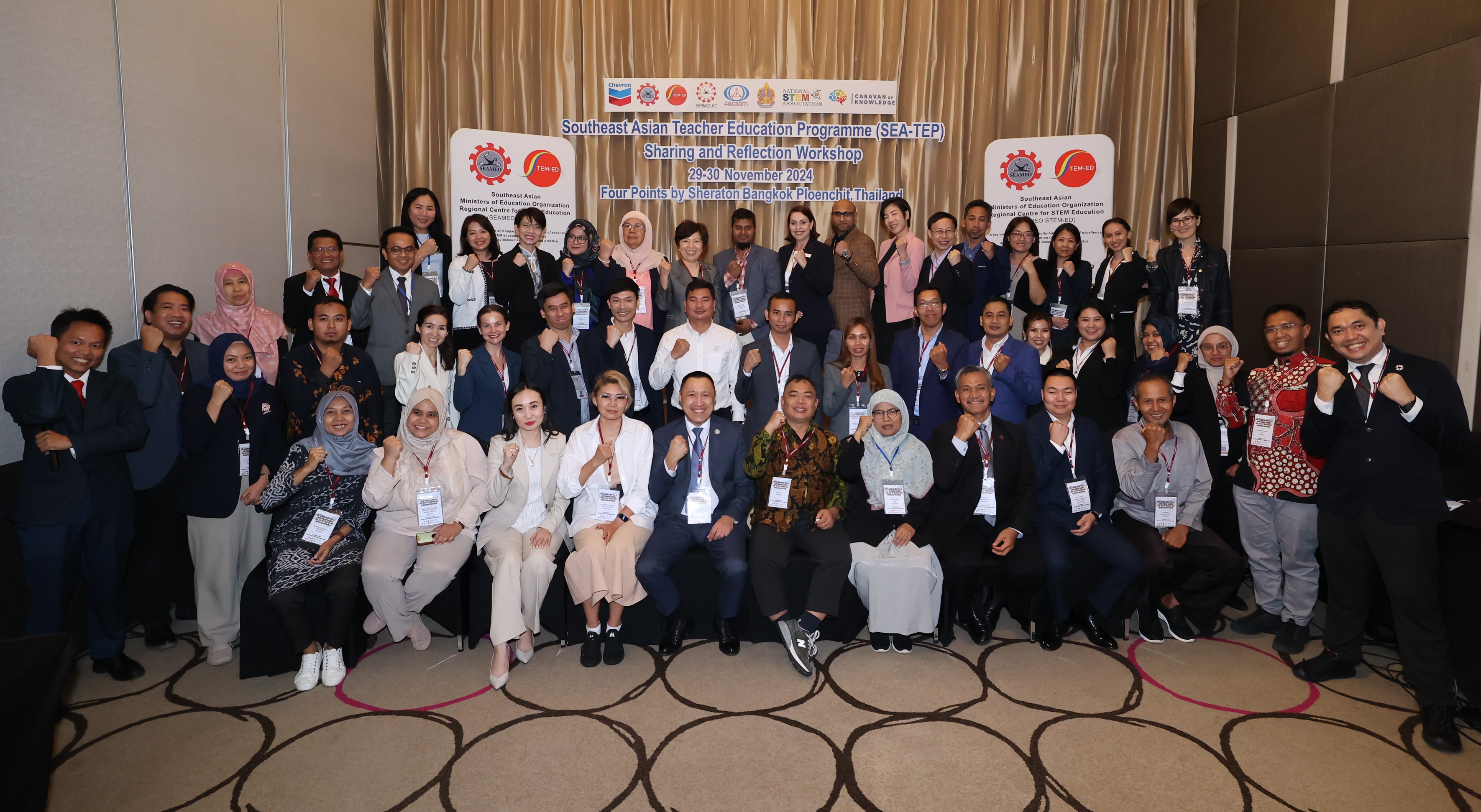
Numerous
reviewed
literature
identified
critical
gaps
in
pre-service
teacher
programs,
including
insufficient
focus
on
effective
pedagogies,
lack
of
effective
classroom
practices
and
inadequate
professional
capacity
to
adopt
quality
STEM
learning
units.
Recognizing
these
challenges,
the
SEA-TEP
program
was
launched
in
January
2023
with
a
mission
to
transform
teacher
education
through
a
STEM-focused
approach.
This
initiative,
driven
by
collaboration
among
policymakers
and
teacher
education
institutions,
aims
to
provide
pre-service
and
in-service
teachers
with
professional
training
and
innovative
curriculum
standards.
The
program
seeks
to
equip
students
with
essential
STEM
competencies
and
implementing
lesson
study
using
the
high-quality
STEM
learning
units,
which
are
embedded
with
Three-Dimensional
Learning
including
scientific
and
engineering
practices,
disciplinary
core
ideas
and
crosscutting
concepts.
Under
scientific
and
engineering
practices,
claim-evidence-reasoning
approach
and
modelling
are
used
to
foster
students
with
critical
thinking
and
analytical
skills,
ability
to
draw
conclusions,
create
a
conceptual
model,
justify
them
as
well
as
develop
evidence-based
argumentation
skills
which
are
needed
to
effectively
tackle
21st
century
challenges.
The key question remains: “How can different countries with specific needs implement this model to align with their national priorities?” The Project presented in Thailand at the recent launch event of the Thai-US Joint-Degree Sandbox for STEM Teacher Education program under the SEA-TEP initiative during late November marked a significant milestone in Thai education, demonstrating a major milestone in how the nation has integrated the practices and curricular standards framework introduced by SEA-TEP into its curriculum and teaching approach through their partner universities. Thailand’s implementation highlights the SEA-TEP model as a proven and adaptable framework, capable of advancing STEM teacher education on a global scale.
First-hand insights from regional educators who have implemented the SEA-TEP model further validate its impact. Mr. Daryn Saiynov, The Head of Caravan of Knowledge, an educational organization in Kazakhstan, stated: “In Kazakhstan, the SEA-TEP program has brought a transformative opportunity to align our teacher education system with international standards. Since joining three years ago, we’ve seen remarkable progress in integrating STEM principles into our curriculum, despite the unique challenges of adapting the model to our context, where science is traditionally divided into physics, biology, and chemistry. Through this program, our educators have embraced interdisciplinary approaches, with some becoming role models for the nation. For instance, one teacher participating in SEA-TEP recently won a national award as one of the top ten educators in the country, inspiring a new generation of teachers. Currently, we are collaborating with one university to implement this initiative, and with the success of SEA-TEP, we aim to expand partnerships to more major universities in the future, further strengthening STEM teacher education and fostering innovation across the country.”
Similarly, Indonesia has adopted the SEA-TEP model to address its unique educational landscape. Dr. Murni Ramli, Coordinator of Professional Working Group, FKIP, Sebelas Maret University (UNS), shared: “Since joining in 2023, we have embraced the challenge of adapting lesson units to our current curriculum, redesigning topics like water quality, climate change, diseases and genetics to suit local contexts while fostering critical thinking and evidence-based reasoning. While shifting teaching mindsets is challenging, open-class practices and intensive training have shown promising results. With strong teacher training networks, we aim to expand this approach across Indonesia, ensuring the modules localized under SEA-TEP can reach educators across the country. By building these foundations, we are preparing our students not just for academic success, but to become global citizens ready to address pressing local, national, and global challenges.”
Building on the outstanding success of the long-running Chevron Enjoy Science program – an eight-year initiative to strengthen STEM education in Thailand in which SEAMEO STEM-ED managed its second phase for three years, the organization leveraged its expertise and networks cultivated through the Chevron-funded program to lay the groundwork for SEA-TEP.
Zamira Kanapyanova, General Manager, Corporate Affairs, Eurasia Pacific, Chevron, emphasized the company’s commitment to education development, stating, “As a multinational energy company, Chevron recognizes the vital role of STEM education in preparing the future workforce with practical skills and creative problem-solving abilities. Through the Chevron Enjoy Science project in Thailand, we adapted U.S. expertise in STEM education for local schools and vocational institutions, achieving proven success. Building on this foundation, we’ve partnered with SEAMEO STEM-ED to improve STEM education across the region through evidence-based policies and the SEA-TEP project with an aim to strengthen teacher preparation and teacher development in networking countries. By empowering teachers, we aim to inspire children to tackle real-world challenges and create lasting impacts in their communities.”
Dr. Kritsachai Somsaman, SEAMEO STEM-ED Centre Director, emphasized the SEA-TEP program’s sustainability for future adoption, stating, “The SEA-TEP model is more than just a framework; it is a transformative solution for reshaping teacher education through collaborative efforts across regional networks. SEAMEO STEM-ED’s role is to support partners in developing STEM learning modules rooted in evidence-based policies and strengthened by regional cooperation. By building the capacity of educational leaders, we positioned SEA-TEP as a scalable model that provides critical insights to enhance STEM capabilities and unlock student potential. Our goal is to empower teachers and faculties to design and implement STEM-focused learning units for both pre-service and in-service educators by 2025.”
SEA-TEP is now entering its next phase, which will place focus on integrating core practices and STEM learning units into pre-service teacher practicum programs and supporting in-service teachers through an open-class professional learning community. Looking ahead, the SEA-TEP program seeks to strengthen regional collaboration and extend its implementation to more countries. It aims to serve as a foundational blueprint for advancing teacher education and spearheading the next wave of global education transformation.
Hashtag: #SEATEP
The issuer is solely responsible for the content of this announcement.
Support InfoStride News' Credible Journalism: Only credible journalism can guarantee a fair, accountable and transparent society, including democracy and government. It involves a lot of efforts and money. We need your support. Click here to Donate
